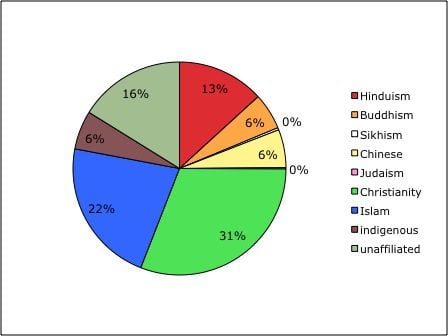In a previous blog, I asked the rhetorical question, “Can religions exist without scriptures?” (Answer: Yes. Religions can and do exist that lack any written scriptures. Many indigenous religions, for instance, are associated with non-literate cultures. They do just fine passing down their religious beliefs and traditional ways without benefit of the written word.)
Here’s another, somewhat similar rhetorical question: Can religions exist without so seemingly an absolutely essential religious ingredient as belief in God?
Answer: Yes.
Religions can (and do) exist that lack belief in God.
Surprised?
Lots of newcomers to the study of religion do find this genuinely surprising. However, the reality is that such beliefs, while they may be at the very core of many religions, are simply not a part of some other religions. The diversity of content that may be genuinely “religious” in character is a lot broader than one might at first expect.
Believe it or not, not all religions believe in God. This might sound strange, at first. But consider how slippery the term and concept “God” actually is. Western monotheisms affirm — as that very term “monotheism” implies — the existence of a single Supreme Being. Jews, Christians, and Muslims alike believe in the same sole God, understood as in some sense “personal” and as the divine creator of all that exists.
But some religions don’t believe in just one single God. Many indigenous religions today believe in a multitude of high gods, nature gods, nature spirits, and ancestor spirits (the lines between which sometimes get a little blurred). Many bygone religions of the ancient past believed in pantheons of deities; think of the gods and goddesses populating the mythologies of such classical civilizations as Greece and Rome, or Egypt and Babylon, to name but a few.
Many modern Hindus today worship any number of deities — Vishnu and Shiva, Rama and Krishna, Nandi and Ganesha, Saraswati and Lakshmi, Kali and Durga, to mention just some of the most popular; Hinduism is traditionally said to have some 330 million gods! Moving westward, contemporary followers of such faiths as Santeria, Voodoo, and Candomble (of Cuban, Haitian, and Brazilian origin, respectively) worship a plurality of divine beings known as orishas, while many adherents of such contemporary forms of Western paganism as Wicca and Druidism also often apprehend the divine in a plurality of forms, or as multiple distinct manifestations.
Some religions may believe in a single Supreme Reality, yet not conceive of it in “personalistic” terms at all (considering it a fundamental and all-too-human error to so “personify” that which is infinite, eternal, divine, and therefore utterly beyond human comprehension). So, while many Hindus worship the divine in the guise of any of 330 million gods, other Hindus instead see all of those personal deities as just so many aspects, facets, or “public images” of a vastly greater (and vastly more incomprehensible) but non-personal Ultimate Reality, which they refer to as Brahman. This form of Hindu thought sees the Divine not as a personal God, but as an impersonal Absolute which not only gives rise to all things, but ultimately in fact is all things. One does not worship or pray to a non-personal, all-encompassing Reality; one instead seeks to discover within oneself one’s own inner identity with That which manifests Itself as everything in existence.
In somewhat similar fashion, Taoists also believe in an ultimate non-personal Reality that precedes all other realities, and from which all other realities have emerged — and remain dependent upon. The Tao is not a deity to be worshipped, but an infinite and eternal force or guiding principle which gives rise to the universe, and which causes all things within the universe to be what they are. Rather than pray to it, Taoists instead seek to align themselves with the Tao, in order to optimally harmonize themselves with it — the better to literally “go with the flow” of that which creates and sustains the universe, and everything in it.
The Brahman of Hinduism and the Tao of Taoism may not be the same things as a personal Creator God, but at least they are… well, “something.” By contrast, Buddhism has nothing where other religions insert their variously conceived “Somethings.” For Buddhists, there simply is no divine personal Creator, and no bedrock transcendental Reality underlying everything. Buddhists seek to attain nirvana, a “state” of eternal bliss (a state which is neither a “state” nor a “non-state,” if you can wrap your mind around that one!). But nirvana is neither a heavenly paradise within which one enjoys the perpetual presence of a personal God, nor a metaphysical union with a transcendental and divine but non-personal Ultimate Reality or Ground of Being. What nirvana is ultimately cannot be put into words — it eludes all human concepts — but whatever it is, it isn’t union with God (or Brahman), since God simply doesn’t figure in Buddhism (and neither does Brahman).
So: can there be such a thing as a religion that lacks belief in God (in the Western monotheistic sense, as a personal Creator)? Of course! Monotheism has no monopoly on religions. Polytheism and pantheism each have their own shares of the spiritual marketplace. And, as surprising as it may seem to some, even outright non-theism has its own slice of the global religious “pie.”

